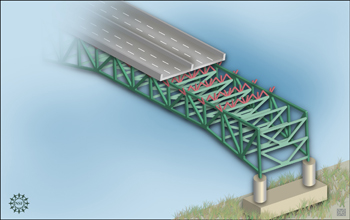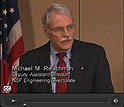Media Advisory 07-026
Bridges on the Brink?
Panel to discuss what we know and what we need to know about structurally deficient U.S. bridges

Artists rendition showing interior of a bridge similar in structure to the I35-W bridge.
September 12, 2007
This material is available primarily for archival purposes. Telephone numbers or other contact information may be out of date; please see current contact information at media contacts.
The tragedy of the I-35W bridge collapse in Minneapolis alerted many to the urgent need to better monitor and maintain thousands of bridges across the United States. For decades, engineers have been studying these bridges and calculating their risk of failure, yet many proposed solutions have not been adopted.
NSF's Directorate for Engineering and the Office of Legislative and Public Affairs invite you to attend a presentation to learn what engineers know about our at-risk bridges; what they are hoping to learn from the I-35W collapse; and how cutting-edge technologies, some already in the testing stages, may provide answers for how to monitor and maintain the long list of bridges deemed structurally deficient.
Presentations Include:
"Bridge Lifecycles, Cradle to Grave"
Richard Sause, Lehigh Univ.
"Learning from I-35W, An Early Look"
Taichiro Okazaki, Univ. of Minnesota
"Bridging New Applications"
Antonio Nanni, Univ. of Miami
When: Wed., Sept. 19, 2007, 2 p.m. - 3 p.m
Where: National Science Foundation
4201 Wilson Blvd., Room 110
Arlington, VA 22230 (Ballston Metro stop)
Enter at corner of 9th & Stuart Streets
The event is open to the public. Registration is requested to ensure that sufficient space is available. Please contact Josh Chamot at jchamot@nsf.gov or (703) 292-7730.
-NSF-
-
View Video
NSF hosts a presentation on what engineers know about at-risk bridges.
Credit and Larger Version
Media Contacts
Joshua A. Chamot, NSF, (703) 292-7730, email: jchamot@nsf.gov
Related Websites
The conclusions from the University of Minnesota's independent study of the I-35W bridge collapse: http://www.cts.umn.edu/Research/featured/35Wbridge/
The U.S. National Science Foundation propels the nation forward by advancing fundamental research in all fields of science and engineering. NSF supports research and people by providing facilities, instruments and funding to support their ingenuity and sustain the U.S. as a global leader in research and innovation. With a fiscal year 2023 budget of $9.5 billion, NSF funds reach all 50 states through grants to nearly 2,000 colleges, universities and institutions. Each year, NSF receives more than 40,000 competitive proposals and makes about 11,000 new awards. Those awards include support for cooperative research with industry, Arctic and Antarctic research and operations, and U.S. participation in international scientific efforts.
Connect with us online
NSF website: nsf.gov
NSF News: nsf.gov/news
For News Media: nsf.gov/news/newsroom
Statistics: nsf.gov/statistics/
Awards database: nsf.gov/awardsearch/
Follow us on social
Twitter: twitter.com/NSF
Facebook: facebook.com/US.NSF
Instagram: instagram.com/nsfgov

